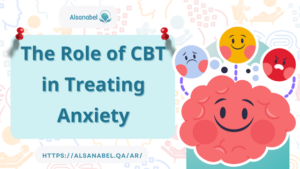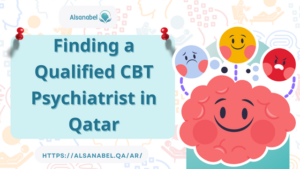Cognitive Behavioral Therapy Qatar for Manage Anxiety and Depression 2024
- Category anxiety treatment in qatar
Cognitive behavioral therapy Qatar provides a valuable approach for those seeking relief from anxiety and depression. This article explores how CBT is utilized in Qatar, highlighting its benefits and the role it plays in helping individuals achieve better mental health and improved quality of life.
The Role of CBT in Treating Anxiety
Anxiety disorders encompass a range of conditions characterized by excessive fear, worry, and avoidance behaviors that significantly interfere with daily life. Common types include generalized anxiety disorder (GAD), panic disorder, social anxiety disorder (social phobia), specific phobias, and others.

- Cognitive Restructuring:
- CBT helps individuals identify and challenge negative or distorted thinking patterns that contribute to anxiety. These may include catastrophic thinking, overestimating danger, or assuming the worst-case scenario.
- Therapists work with clients to reframe irrational beliefs and replace them with more balanced and realistic thoughts. This process reduces the intensity of anxiety-provoking thoughts and promotes a sense of control over anxious feelings.
- Exposure Therapy:
- CBT employs exposure techniques to help individuals confront feared situations or stimuli in a gradual and systematic manner.
- Through repeated exposure, clients learn that their anxiety responses decrease over time, leading to habituation and decreased fear responses. This approach is highly effective for phobias, social anxiety, and other anxiety disorders.
- Behavioral Techniques:
- Encourages individuals to engage in activities that promote relaxation, pleasure, and a sense of accomplishment. This counteracts avoidance behaviors and increases resilience against anxiety triggers.
- CBT teaches practical skills such as relaxation techniques (e.g., deep breathing, progressive muscle relaxation), assertiveness training, and effective problem-solving strategies.
- Psychoeducation:
- Therapists educate clients about the nature of anxiety, common symptoms, and physiological responses. This knowledge helps normalize experiences and reduces uncertainty and fear.
- Clients may track their anxiety symptoms and triggers to identify patterns, gain insights into their condition, and evaluate progress throughout therapy.
- Relapse Prevention:
- CBT equips individuals with long-term coping strategies to manage anxiety symptoms independently after completing therapy.
- Clients learn to recognize early signs of anxiety recurrence and implement strategies to prevent relapse, enhancing long-term resilience.
Effectiveness of Cognitive behavioral therapy Qatar for Anxiety:
- Evidence-Based Practice: CBT for anxiety disorders has robust empirical support, demonstrating significant reductions in anxiety symptoms and improvements in overall functioning.
- Tailored Approach: Therapists customize treatment plans to meet individual needs, considering the specific type of anxiety disorder, severity of symptoms, and client preferences.
Integration with Other Treatments:
- Combined Approaches: CBT may be combined with medication (e.g., antidepressants, anxiolytics) or complementary therapies (e.g., mindfulness-based techniques) for enhanced treatment outcomes, particularly in cases of severe or treatment-resistant anxiety.
CBT is a structured, goal-oriented therapy that addresses the cognitive, emotional, and behavioral aspects of anxiety disorders. By helping individuals understand and modify their thought patterns, confront feared situations, and acquire coping skills, CBT empowers clients to effectively manage anxiety and regain control over their lives. Its evidence-based approach and versatility make it a cornerstone in anxiety treatment in Qatar, offering hope and lasting relief to those experiencing excessive worry and fear.
How CBT Helps Manage Depression
Cognitive Behavioral Therapy Qatar is highly effective in managing depression by addressing the cognitive and behavioral patterns that contribute to and perpetuate depressive symptoms. Here’s how CBT helps:
- Identifying Negative Thought Patterns: CBT helps individuals recognize and challenge negative thought patterns, such as self-criticism, pessimism, and hopelessness. These cognitive distortions often contribute to depressive feelings and behaviors.
- Restructuring Thoughts: Therapists using CBT work with patients to reframe negative thoughts into more balanced and realistic perspectives. This process helps individuals develop healthier and more adaptive ways of thinking about themselves, their situations, and the future.
- Behavioral Activation: CBT encourages individuals to engage in activities that bring pleasure, satisfaction, or a sense of accomplishment. Depression often leads to withdrawal and reduced activity levels, but behavioral activation helps counteract this by increasing positive interactions and reinforcing adaptive behaviors.
- Skill Building: CBT equips individuals with practical coping skills to manage depressive symptoms effectively. These may include relaxation techniques, problem-solving skills, assertiveness training, and stress management strategies.
- Setting Realistic Goals: Therapists collaborate with patients to set achievable goals that promote a sense of accomplishment and self-efficacy. Accomplishing these goals can boost self-esteem and motivation, which are often diminished in depression.
- Addressing Interpersonal Issues: CBT may involve exploring and addressing interpersonal conflicts or difficulties that contribute to depressive symptoms. Improving communication skills and interpersonal relationships can reduce social isolation and enhance support networks.
- Monitoring Progress: CBT emphasizes tracking progress and monitoring changes in mood and behavior over time. This helps both therapists and patients assess the effectiveness of interventions and make adjustments as needed.
- Preventing Relapse: CBT not only helps manage current depressive symptoms but also teaches skills for preventing relapse. Patients learn to recognize early warning signs of depression and implement strategies to intervene before symptoms escalate.
- Complementing Medication: For individuals receiving medication for depression, CBT can complement pharmacological treatment by addressing underlying psychological factors and promoting long-term recovery.
- Empowerment and Self-Care: Ultimately, CBT empowers individuals to take an active role in their mental health care. By learning and applying CBT techniques, patients develop a greater sense of control, resilience, and ability to manage depressive symptoms independently.
CBT is typically conducted over a structured series of sessions, often ranging from several weeks to several months, depending on the severity of depression and individual treatment goals. It is delivered by qualified therapists, including psychologists and psychiatrists, who specialize in Cognitive behavioral therapy Qatar techniques tailored to each patient’s unique needs and circumstances.
Finding a Qualified CBT Psychiatrist in Qatar
Finding a qualified Cognitive Behavioral Therapy (CBT) therapist in Qatar involves several steps to ensure you receive effective and professional mental health care. Here’s a guide on how to find a qualified CBT psychiatrist in Qatar:

- Referrals and Recommendations: Ask for referrals from your primary care physician, friends, family members, or other healthcare professionals in Qatar. Personal recommendations can provide valuable insights into the therapist’s expertise and effectiveness.
- Online Research: Use online resources such as healthcare directories, hospital websites, or mental health services in Qatar listings specific to Qatar. These platforms often provide information about therapists’ specialties, qualifications, and contact details.
- Check Credentials and Specialization: Verify the therapist’s credentials, including their education, training, and certifications in Cognitive Behavioral Therapy. Look for therapists who have specific training and experience in CBT techniques and methodologies.
- Hospital and Clinic Affiliations: Consider therapists affiliated with reputable hospitals, clinics, or therapy centers in Qatar. These institutions often have stringent criteria for selecting therapists and provide oversight to ensure quality care.
- Experience with Your Concerns: Assess the therapist’s experience in treating conditions similar to yours using CBT. Some therapists specialize in specific areas such as anxiety disorders, depression, PTSD, OCD, or behavioral issues, so finding a therapist with relevant experience is beneficial.
- Initial Consultation: Schedule an initial consultation with the psychiatrist in Qatar to discuss your concerns, treatment goals, and to assess your comfort level with their approach. Use this meeting to ask questions about their experience with CBT, treatment methods, and what to expect during therapy sessions.
- Cultural Sensitivity: Choose a psychiatrist in Qatar who demonstrates cultural sensitivity and respects your cultural background, beliefs, and values. Cultural competence is essential for effective therapy and building a trusting therapeutic relationship.
- Insurance Coverage: If you have health insurance coverage, check if the therapist accepts your insurance plan. Confirm any out-of-pocket costs, copayments, or insurance requirements before starting therapy sessions.
- Feedback and Reviews: Read patient reviews and testimonials about the therapist’s services. Positive feedback from previous clients can provide insights into their professionalism, empathy, and effectiveness in delivering CBT.
- Professional Organizations: Consider psychiatrist in Qatar who are members of professional organizations related to psychology or counseling in Qatar. Membership in such organizations often indicates adherence to ethical standards and ongoing professional development.
- Telehealth Options: Explore telehealth options if you prefer remote therapy sessions. Therapist in Qatar offer CBT sessions via secure online platforms, which can be convenient for individuals living in remote areas or with busy schedules.
By taking these steps and conducting thorough research, you can find a qualified CBT therapist in Qatar who meets your specific mental health needs and provides the support and guidance you need to achieve your treatment goals effectively.
In conclusion, Cognitive Behavioral Therapy Qatar offers a valuable resource for managing anxiety and depression. By focusing on the connection between thoughts, feelings, and behaviors, CBT helps individuals develop practical skills to cope with and overcome their mental health challenges. As awareness and accessibility of mental health services continue to grow in Qatar, CBT stands out as an effective and evidence-based approach, empowering individuals to lead healthier, more balanced lives.









